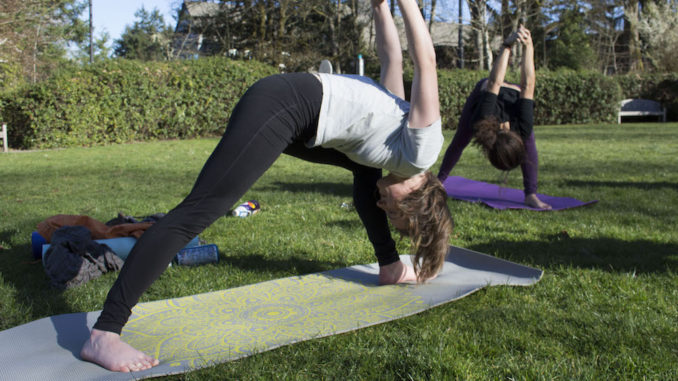
By Mackenzie Bath
Sweat drips down my face, my heart is pounding and my breath is short. Why did people tell me this would make me feel better? That is what goes through my mind every time I play a sport to try to improve my mental health.
Activities such as drawing, meditation and maintaining a healthy diet are frequently touted as possible solutions to mental health problems and are usually listed among the “helpful” tips and tricks that increase student happiness. Exercise is one that I hear almost every time. People are constantly telling me that working out will pump my endorphins and make me feel better. They tell me to run or to go to the gym. Like many others, I have responded to these proposals with skepticism. I am not a huge fan of running, so I did not want to try it. After a while, I finally decided to figure out what this exercise thing was all about.
I hated it. It was sweaty, exhausting and miserable. I could not imagine why anyone would have told me to try that or why they thought it would make me feel better.
I know I am not alone in this experience. Myself and others have tried it, only to find it did not work. We moved onto other things that might make us feel better. For me, this includes writing, theater and grounding methods (grounding is when you take root in the physical world to calm your splintering thoughts). Still, this did not dissuade people from trying to convince me that exercise was the only way to really improve my mental health. It is not the only answer nor is it inherently the best answer, but others did not get that. They kept telling me to try. So, reluctantly, I listened because I thought they must be on to something. I tried again. It was just as awful as it was before.
That is the truth that people do not tell you. Exercise does not work at least not right away. This year, I started to do yoga with the Yoga Club on campus because people talked about how relaxing it was. When I tried it, it was painful, tiring and, again, sweaty. But slowly, surprisingly, it started to get better. I could not believe it, but I was no longer exhausted at the end of practice and I actually felt better by the end of each hour. I was surprised to find out that maybe those people telling me to exercise were on to something. Sometimes I can keep up with the class, and sometimes I cannot. I think people can get discouraged easily when they do not do well on something right away, or even after working at it for a while. It is totally OK to be bad at yoga, or whatever it is you do. The only way to get better, and for it to help, is to keep going. Of course exercise and other mechanisms like grounding and drawing cannot cure mental illness, and they may not even help right away. They can, however, be an incredible tool. There are many things, including diet, exercise and medication, that help people to improve their mental health over time. These things can help make life a little bit easier when you deal with a mental illness or disorder. This does not mean that they will work for everyone.
In treating mental health issues with medication and other coping mechanisms, I understood that it was a long game. For some reason I did not realize that it would be the same with exercise; I think a lot of people are initially discouraged for the same reason. All of these things take time and practice, even when we wish that they would not. People tell us that exercise will make us feel better, but their explanation of the science makes it sound like it should happen right away. People who have been exercising for a long time are going to be better at it than I am. Exercise starts hard, gets easier and can become more rewarding.
It just takes time. That is what no one tells us: it is going to suck. It is going to hurt and you will be even more upset and tired than you were before. Then, suddenly, you will notice that you are not in as much pain as you were yesterday. The exercise gets easier, you start to not hate it and eventually you realize it is making you feel better. So they were right. They just did not tell us everything.
Subscribe to the Mossy Log Newsletter
Stay up to date with the goings-on at Lewis & Clark! Get the top stories or your favorite section delivered to your inbox whenever we release a new issue.

Leave a Reply